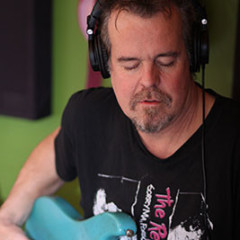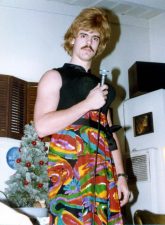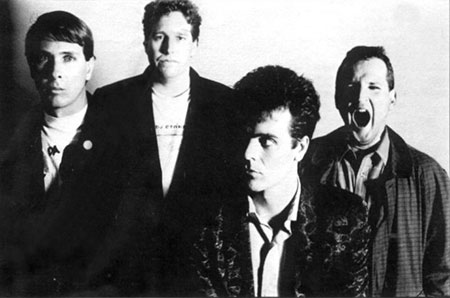 Members of the MusicTAP Staff take a moment to reflect upon the passing of bassist Tim Chandler from the bands Daniel Amos (DA), The Choir, The Swirling Eddies, and The Lost Dogs. Chandler was also a prolific session performer who graced many albums, too many to recount. The announcement of his passing came on Monday, October 8.
Members of the MusicTAP Staff take a moment to reflect upon the passing of bassist Tim Chandler from the bands Daniel Amos (DA), The Choir, The Swirling Eddies, and The Lost Dogs. Chandler was also a prolific session performer who graced many albums, too many to recount. The announcement of his passing came on Monday, October 8.
Dan MacIntosh: When Tim Chandler passed away, the world lost one of its greatest rock bassists. Most of the world doesn’t realize this, nor will it ever. However, those that grew up on California (particularly Southern California) Christian rock, were blessed to experience Chandler’s distinctive playing in two of its iconic bands: The Choir and Daniel Amos. Pick any of your two favorite bands, from any era, and just imagine each band sharing one important member. It would be like Nirvana and Pearl Jam, Radiohead and U2, or the Beatles and the Rolling Stones platooning a one pivotal musician. Impossible, you say? Well, this was the unusual case with Tim Chandler’s unique dual memberships.
I feel a little unqualified in praising Chandler’s bass skills. The bass has never been one of my favorite rock instruments, and bass parts are rarely elements I gravitate toward whenever evaluating rock recordings. I can quickly name you a few of my favorite jazz bassists, such as Ron Carter and Jaco Pastorius, namely because these men revolutionized the role of the bass sound in jazz music. Maybe this apprehension, as well as subtle disrespect, is because so many lead singers play bass, which – rightly or wrongly – makes that instrument seem like the least challenging element in the standard rock band configuration. John Entwistle, with his amazing fills for The Who’s “My Generation,” is one of the few places where I took special notice of the bass part.

Another exception to my rule, though, was Darn Floor, Big Bite, which a music critic friend immediately at the time memorably referred to as, ‘Great F-ing noise!’ This exclamation was, at least in part, because Chandler’s playing is central to so many of this album’s tracks, on an album most consider one of Daniel Amos’ best. Also, that’s Chandler rumbling along on the bottom end of The Choir’s “Sad Face.” Chandler was the sort of musician that made even non-appreciators of the bass sit up and take notice. Examples of his standout playing are many, and well worth any sincere music fan’s exploration.
Chandler was a musical genius, but never were words of that nature uttered by this quiet man. I did, however, hear it from his bandmates — often. I recall interviewing Terry Taylor after the release of The Swirling Eddies’ Zoom Daddy, where he told me how so many of the songs’ lyrics were inspired by Chandler’s wildly creative instrumentation. Genius always recognizes genius.
It wasn’t until the advent of social media, though, that I began to recognize Chandler’s wicked sense of humor. He really could have written humorist books. Much of his stories were drawn from crazy and underappreciated tours on the Christian music circuit. Before Facebook, though, I hazily recall Chandler playing bass with Phil Keaggy’s band wearing a colorful green skirt. A man with his irrepressible wit made him the perfect choice to support Tonio K, back when Mr. K was making inroads to Christian music. Once again, these examples offer further proof that, where there was musical greatness, Chandler wasn’t far away.
Personally, this one hurts as much as the losses of Gene Eugene and Mark Heard. Like Eugene and Heard, Chandler was too young to die. Also like his newfound fellow heavenly citizens, he left an indelible mark on every piece of music he touched and will remain an irreplaceable treasure.

Craig Ellis Bacon: The Fondest Memories & Affections Make for the Deepest Sadness in Mourning
I discovered the music of Tim Chandler by way of a P&W (that’s Praise & Worship for you lucky enough not to know) album that he didn’t even play on. But I really liked this one singer on it, so when I came across another CD with a sticker boldly proclaiming the name ‘Derri Daugherty’, it was purchased immediately. The Green Room Serenade Part One by The Lost Dogs was my gateway into bands like The Choir & Daniel Amos. I didn’t know it at the time, but soon my voracious consumption of album liner notes apprised me of the fact that one Tim Chandler played bass on pretty much every song by pretty much every band I was digging at the time.
Cliche or no, it’s true—I really had never heard anything like the sinuous bass lines and towering tone featured on songs like “If You’re Listening” (The Choir), “Sweet Work of Love” (The Lost Dogs), “Who’s Who Here” (Daniel Amos), and “I Had A Bad Experience With The CIA And Now I’m Gonna Show You My Feminine Side” (The Swirling Eddies). I don’t think I had a favourite bass player before that. But to this day, if you ask me for my Top 5 bassists of all time, I’ll think of names like Chris Squire, Jonas Reingold, Jimmy Garrison, and Geddy Lee, but only after the words ‘Tim Chandler’ have left my lips.
And cliche or no, it’s true—Tim was a unique musician, a singular musical voice. He didn’t play the bass so much as he tortured it, wringing out countermelodies that can’t have been extracted painlessly. He was like one of those old school wooden roller coasters: every movement full of shake and rattle, always threatening to careen right off the tracks before pulling an impossible last-minute turn. Whiplash was a real possibility, but a joyous rush of fun was guaranteed. Indeed, Tim was one of the few musicians whose playing I would describe as musically dangerous.

Most of my interactions with Tim Chandler the man came online. He regularly participated in message board (!!!!!!) discussions on his bands’ forums. Like, he would go out of his way to check in, ask about how people were doing, and respond to each person in a thread by name. He told gut-busting behind-the-scenes stories, and carried on vicious personal attacks against himself as the windex-guzzling alter ego with delusions of grandeur, Berger Roy Al.
I did meet Tim once. When Daniel Amos toured in 2011 after a long hiatus from the road, Tim wasn’t able to join the tour due to day job commitments. But when I pulled into my parking spot at the opening gig in Nashville, Tim Chandler was walking past, a few scant feet from where I sat. Quite literally, I had to take a few moments to compose myself before I could exit the vehicle. My wife says that I “fanboyed hard,” but she’s politely understating my reaction. I freaked out in a manner that still surprises me as I remember it. Later, in the pre-show meet & greet, Tim slipped quietly in and sat at a table. I so very awkwardly—equal parts trepidatious and gushing—approached him for an autograph. “You’re my favourite bass player and you’ve been a huge influence on me,” I managed to say.
Tim’s eyes lit up, and he leaned forward. “Oh, do you play bass?”
I think he thought I wanted to talk shop. “Er, no, I just listen to a lot of music.”
“Oh.” Where do you go next? Neither of us seemed sure, so I meekly received my autograph and retreated. It was the dumbest, shortest conversation to have with your musical hero, and I treasure it. I was ridiculously awkward in approaching him, and he did his damndest to pretend I wasn’t.
I didn’t know that Tim was ill. His death has hit me as a complete shock, and the combination of shock and sadness has devastated me. I say that fully realizing that I’m just a guy who loved his music and had a friendly but barely-existent relationship with the man. But it’s how I feel. I went through my music collection: I own 64 LPs, CDs, & DVDs featuring Tim Chandler. That’s just physical media; counting MP3 albums comprising demos, bootlegs, etc., the number is around 80. As a listener, I don’t think I’ve had a more extensive musical relationship with any one individual. It’s a different relationship than what family and friends are mourning, but in its own way, it’s an intensely deep and intimate relationship. And thus I am so, so thankful for the music that remains, the stories and antics preserved by the Internet, and my few awkward moments meeting Tim in person. But I am so, so, so sad that these good things are now circumscribed by his death.

Dw. Dunphy: “It’s not the fate, it’s the finality…”
It’s wrong for me to be so affected by the passing of bassist Tim Chandler. I knew his music more than the person himself. Meanwhile, his family, friends, and bandmates have to try to make sense of his absence, and in this, they’ll likely fail and they are knowingly preparing for that.
I don’t know the circumstances. An announcement will be forthcoming, and even then, I won’t want to believe it.
I’ll get to why you should care about Tim Chandler in a moment, but I’ll lead off with why I do. Tim was funny. Tim was kind. Tim often broke that fourth wall and reached out to people when he could have, instead, maintained that separation. I recall many years ago when my review of Velvet Revolver’s first record, Contraband (2004), came out. I liked the record, but didn’t love it and slathered on the measured praise for what, to me, was more Guns ‘n Roses with the lead singer from Stone Temple Pilots than an entirely new and unique entity. Tim reached out to me and thanked me for my perspective on the album.
I was surprised. His message meant a lot to me because I admired him so much, and the statement was entirely unexpected. He was, to me, not just one of the best bass players but one of the first I fully appreciated. He was incredibly funny, both as himself and as his warped alter ego, Berger Roy Al. We’d go to town on Facebook as he’d proclaim, “I’ve done it now! I’ve finally defeated Chandler!! Hgghhfff ggghhkk!!” I’d punt the conversation back and forth and riff on the insanity. It was great fun.
For the better part of my life, I had record players and cassette players with poor bass resonance, so very often, I didn’t hear what the bass player was doing. Tim Chandler didn’t suffer that problem with me because he didn’t play like a bass player, or rather, he could when the song required it, but he was more adventurous than that. See, most bass players have two avenues they can take. One is there to fill the sonic space on the low end, so they will play a lower harmony to the main melodic line. It can be effective, but to the casual listener, nothing is there to call attention to itself. The other bass approach is rhythmic. The bass acts as a percussion instrument – in tune, of course – but the main purpose is to bolster and magnify the beat.

Tim Chandler played the bass like a lead guitar. His bass lines weaved through a song and danced around the traditional guitar leads, and always, always mattered. There are tons of jokes about how the bass player tends to be a roadie who needs some cheering up – tonight is your night, bro! – rather than being an integral part of the musical palette. That wasn’t Tim.
And what bandmates. As regular bassist for both The Choir and Daniel Amos, as well as DA offshoot The Swirling Eddies (which fostered the Berger Roy Al persona), de facto regular bassist for The Lost Dogs, and innumerable session recordings for other artists, Tim “played well with others.” The Choir’s Derri Daugherty loves texture, echo, and tuned feedback. DA’s Jerry Chamberlain likes a good old fashioned rock ‘n roll rave-up as Greg Flesch goes for art-rock angularity, and in all three cases, Tim made the sound cohesive and crucial. Tim lugged no one’s gear (unless, you know, they needed it).
DA/Swirling Eddies leader Terry Scott Taylor once said in an interview that the record Zoom Daddy “…was Tim’s record, really.” Chandler encouraged Taylor to play more lead guitar himself, plugging straight into the mixing board rather than going to the amp, then mic, and then to the board. He also encouraged Taylor to go nuts conceptually, thus producing titles like “I Had A Bad Experience With The CIA And Now I’m Gonna Show You My Feminine Side” and “Art Carney’s Dream” to which they then worked out proper songs. One of the band’s most enduring tracks, “The Twist,” came from those sessions, as did the dirty, fuzzy groove of “Pyro Sets A Wildfire” wherein the Eddies channeled Chandler’s beloved Rolling Stones, a’la “Honky Tonk Woman.”
On the DVD for the making of DA’s Mr. Buechner’s Dream, Chandler prat-falled and comedically stumbled through what could have been another super-dry “making of” documentary – an impossibility with those guys, but even so – and in off hours, Taylor and Chandler concocted The Farm Beetles, a “tribute” to the Beatles, but only barely.
I hate the word “sublime,” but I cannot describe Tim’s work on “Salamander” in any other way. It opens The Choir’s 1996 album Free Flying Soul, and while all members of the band – Steve Hindalong on drums, Daugherty on guitar, and later Dan Michaels with a searing solo at the bridge – are at their heights, it’s Tim’s walking bass that is peering around the melodic corners, practically singing counterpoint while, at the same time, binding things together. Again, just as Richard Lloyd and Tom Verlaine played lead guitar in Television, Tim partnered with Derri rather than merely filling the low end. Mutual respect, mutual musicality, and they probably had to lug their own amps and gear bags.
Last year, close to this very time, I attempted to contact Tim as I was working up an essay about the fourth of DA’s Alarma Chronicles records, Fearful Symmetry. At the same time, I was taking care of my dad who had a heart attack in the middle of September 2017 while also holding down the day job. He’d asked for my phone number and I believe I gave it to him, but because of things being so chaotic in my life, I missed the call. He hit me up on Facebook, and I explained what was happening in vague terms. So weird – I did not want to utter the details out of some bizarre superstition that, if I threw it out to the universe, I might give it bad ideas. I hoped to reschedule that call, but my life was now filled with all manner of new vocabulary like “arrhythmia,” “atrial fibrillation,” and “cardioversion,” alongside the longstanding “monitoring for latent leukemic issues.” At that moment, I didn’t have much space between my ears for much else and I missed the opportunity to speak with him.
I would have said, “Thank you.” I would have said, “How are you doing and are you taking care of yourself?” I would have prodded him for one of those lunatic road stories about life with DA on the fringes.
Woulda, coulda, shoulda. I’m now writing an obituary for Tim Chandler, who passed away at the unfathomably young age of 58. I wish that this was a fraudulent ticket and he couldn’t have boarded that plane.

